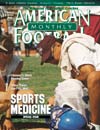AMERICAN FOOTBALL MONTHLY THE #1 RESOURCE FOR FOOTBALL COACHES
Article CategoriesAFM Magazine
|
The Other CoordinatorIf used properly, athletic trainers can be the MVP of a coaching staffby: Barry Terranova © More from this issue Throughout the life of our magazine (now American Football Monthly), I have very seldom written articles. But, when we conceptualized this special issue on sports medicine, I immediately decided to author a piece on the role of the sports medicine staff for a football team. I wanted to do this because I strongly believe athletic trainers and sports medicine staffs are potentially one of the most under utilized and overlooked aspects of a successful football program. Lets face it; the most valuable assets for any coach are the players on his team. As a smart manager, which any successful coach must be, the coach must protect his resources. How can a coach best protect his assets and insure that his best 22 suit up on game day? He must fully incorporate his athletic trainer into his staff and use him or her to keep the....The full article can only be seen by subscribers.
|
|
|||||||
| HOME |
MAGAZINE |
SUBSCRIBE | ONLINE COLUMNISTS | COACHING VIDEOS |
Copyright 2025, AmericanFootballMonthly.com
All Rights Reserved





